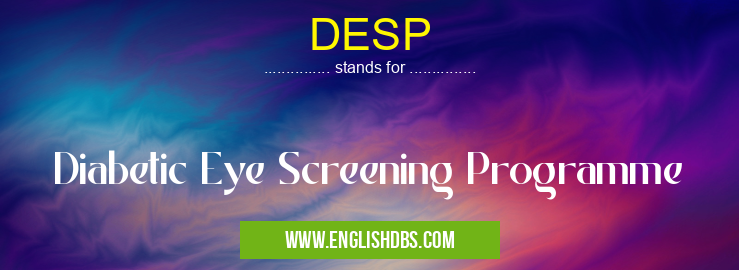What does DESP mean in CLINICAL MEDICINE
DESP stands for Diabetic Eye Screening Programme. It is a public health initiative aimed at detecting and managing diabetic retinopathy, a leading cause of sight loss among people with diabetes.

DESP meaning in Clinical Medicine in Medical
DESP mostly used in an acronym Clinical Medicine in Category Medical that means Diabetic Eye Screening Programme
Shorthand: DESP,
Full Form: Diabetic Eye Screening Programme
For more information of "Diabetic Eye Screening Programme", see the section below.
What is DESP?
DESP is a comprehensive program that involves:
- Regular eye examinations: People with diabetes are recommended to have regular eye exams to check for signs of diabetic retinopathy.
- Early detection: The program aims to identify diabetic retinopathy at an early stage when it is most treatable.
- Referral for treatment: If diabetic retinopathy is detected, patients are referred for appropriate treatment, such as laser therapy or intravitreal injections.
- Monitoring: Patients who have been treated for diabetic retinopathy are regularly monitored to ensure the condition is controlled and prevent further vision loss.
Importance of DESP
- Prevents sight loss: Early detection and treatment of diabetic retinopathy can significantly reduce the risk of sight loss.
- Improves quality of life: Diabetic retinopathy can affect daily activities and social interactions. DESP helps people with diabetes maintain their vision and quality of life.
- Reduces healthcare costs: Treating diabetic retinopathy in its advanced stages can be expensive. DESP aims to prevent these costs by identifying and treating the condition early.
Accessibility of DESP
DESP is typically offered through government healthcare systems or charitable organizations. It is usually free or low-cost to patients, ensuring accessibility for people with diabetes.
Essential Questions and Answers on Diabetic Eye Screening Programme in "MEDICAL»CLINICAL"
What is the DESP?
The Diabetic Eye Screening Programme (DESP) is a free NHS service that offers regular eye checks to people with diabetes. Diabetes can damage the blood vessels in the eyes, which can lead to sight loss if not treated. The DESP aims to detect and treat any eye problems at an early stage, before they cause any permanent damage.
Who is eligible for the DESP?
Anyone with diabetes is eligible for the DESP, regardless of their age or type of diabetes. You can register for the DESP with your GP or optician.
How often should I have a diabetic eye screening?
You should have a diabetic eye screening at least once a year. If you have any symptoms of eye problems, such as blurred vision or floaters, you should see your optician or GP as soon as possible.
What happens at a diabetic eye screening?
At a diabetic eye screening, your optician or nurse will:
- Check your vision
- Examine the inside of your eyes
- Take a photograph of the back of your eyes
- Check your blood pressure
- Ask about your diabetes control
What are the benefits of having a diabetic eye screening?
Diabetic eye screening can help to:
- Detect and treat eye problems at an early stage
- Prevent sight loss
- Improve your quality of life
Final Words: DESP is a vital public health program that plays a crucial role in preventing sight loss from diabetic retinopathy. By providing regular eye examinations, early detection, and timely treatment, DESP helps people with diabetes maintain their vision and improve their overall health and well-being.
